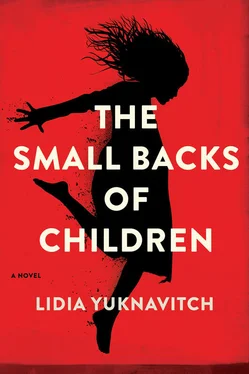Later, after each needle is removed, after the Pole is carefully wiped with antiseptic and given water and a loving warm hand bath by the naked poet and the Moroccan, after she is double body-cradled and sung to and rocked, all three women fuck the night into dawn, trading powers and alliances, surrendering or annihilating without attention to origin or plan. There is blood from more than one body. Mouths attack and retreat. Bruises rise like bomb blasts. Hands and fingers disappear into tunnels and caves. There is piss and cum and tears. Smears of shit make new symbols on the sheets. The sounds coming from the room would be intolerable to anyone on the outside, were it not for the fact that the lodgings are bought and paid for.
Then, after, she sleeps like a baby, heaped there with them on a bed made from women without rules.
She wakes with her face nearly smothered between two swollen breasts — Polish, whiter than white. The other body spoons her from behind — African Moroccan, so black it is blue. She is between nations. The salt and stick of cum between her legs smears across her thighs and ass and on her cheek and shoulders. A streak of blood near her mouth, the taste of metal. The scent of the inside of women is pungent and loud even inside her breathing. She licks her teeth and opens her mouth as if to speak, but she is not speaking.
It is the silence before the line.
Briefly she wants to linger there. Maybe she wants to die there. Then not. She gets out of bed, stumbling like a drunk morning-after man. She looks and looks and finds nothing, no pen, no pencil. Where the fuck is anything? Where the fuck is she? Right. Not her own room.
A purse on the floor.
She rummages through it. Women shit. Kohl eyeliners — penlike. Paper? Nothing nothing nothing. She scans the room in that way that eyes work in the early morning, meaning not much, malfunctioning lenses.
Pillowcase.
And thus she begins, the first line already bursting toward rupture in her brain, what other people would call a hangover or the cusp of a migraine. She nearly barfs before she can get it down:
This impression I could ravish us/this blood-bodied pang
Her phone rings. She holds it to her ear.
The difference between a sentence and a line.
The writer has been hospitalized again, says the voice. She has stopped eating, speaking, everyone has gathered there at the hospital. Won’t she, please, come ?
History and time open like a mouth, inside which pulses the small pang of an ordinary woman.
Why is everything in hospitals the color of mud or mold? The playwright stops typing for a second and stares at his hands on his laptop. He can’t believe he’s already writing this. Already twisting it into art. Cannibal. He feels a pang of guilt. You’re in a hospital. Your poor sister is dying. But even as his heart is beating him up in his chest, he can’t not do it. He can’t. He looks up at the strange and sporadic rivulet of people coming by to see his sister: former students, acquaintances, colleagues, fans of her books. It’s a pitch-perfect humanity parade. If he doesn’t get it down right now, it will blur and hum away like a train.
She’d be on his side. Wouldn’t she?
Then again, she’s dying. That’s what they’re all so somber about. When they spot him in that Naugahyde chair, hunched over a laptop, they must think he’s odd. But there is a profound sibling secret, like a spider’s thread, from his body to hers: No one knows more about the death in life and life in death than he and his sister. Their family a war zone. He breathes the artificial air. God, this place smells like someone shit antiseptic.
When they were children, he used to make his sister play Romeo and Juliet with him. Love scenes and death scenes from the play, which he’d been assigned in school. Though she was only six at the time, and he fifteen, he reconfigured his sister into a Romeo. Green leotard tights and a black down ski vest. He even cut her hair in what he considered an Elizabethan style, much to his mother’s dismay, and talked her into a small codpiece he’d made from a sock. He taught her many of Romeo’s lines to Juliet— let lips do what hands do — wherefore art thou —kid sisters were like chimps, you could get them to mimic anything. Her adoration knew no bounds. He’d stand at the top of the stairs, his sister at the bottom, all her longing in words and body reaching upward to him.
She was good.
Although no one, in any production he’d seen since — in Central Park, London, L.A., Venice — had been a finer, more beautiful, bath-towel-for-hair-hanging-past-his-ass Juliet than he’d been, in his mother’s silk robe.
But during one of their private performances, when he was sixteen and she was seven, his sister did the unthinkable: she improvised a line. Pity the small backs of children, he heard her saying. They carry death for us the second they are born. They gazed at each other with a heavy stillness, then, his Juliet at the top of the carpeted stairs, her Romeo holding his hand out and up toward her, like faith.
“That’s not your line,” he said.
“But it is,” she’d said. “My line.” And she’d grabbed at her codpiece and thrown it to the shag carpet. It was their last performance together. Something was shifting, he remembers thinking. She was acting more like Hamlet than Romeo.
He can see her clearly now, in his mind’s eye. Was she a writer even then, his sister? At six, seven years old? Some strange prodigy primate taking form underneath him?
Sometimes it feels as if he can’t exit the family drama he left when he was sixteen. Or thought he left.
His skin itches. Doesn’t it? He scratches his own wrists three times. Six. Nine. He knows exactly what the itching is. He feels all wrong, away from the calm and the cedar-soap smell of his lover’s skin, the ground wire of his voice. He can feel his own internal organs lurching, especially his lungs and heart and possibly his prostate. Can one feel one’s prostate? He takes a deep breath. Holds it for three seconds. Blows it back out, pacing his breathing. He does it three times. He hears his lover’s voice: You need to self-soothe. Self-soothe! Self-soothe.
He closes his eyes. He sees his lover’s body in the dark of their penthouse bedroom. New York City night light — the moon, the windowed eyes of adjacent buildings, neon signs and street traffic glow — illuminates the terrain of his lover’s body: the top of a shoulder, the hill of a hip, his hair like a forest of wood shavings. He can smell the skin of his lover. He breathes him. Cedar-scented soap cedar-scented soap cedar-scented soap.
The only calm he has ever known has come from this: a man loving a man in the face of this city, in a room lit by night and skin. Why can’t he always feel like this? He grinds his teeth exactly three times. Every other moment of his life, his ordinary life, ordinary days and hours and weeks and the ever-excruciating ticking and grating of time and tasks and human pretenses, feels to him like a series of chops. Like a carrot cut quickly on a wooden block. He hears the chop chop chop in threes. He doesn’t want to leave this room. He doesn’t want to feel anything outside this room. He wills the chopping sound to stop by breathing in cedar and skin. The chopping sound melds with someone’s heels on linoleum.
His sister. He keeps his eyes closed. Sister. Simultaneous lifeline, loveline, and yet stone to the bottom of everything.
An alarm goes off in the distance. Some other hallway. Code blue . Some shuffle of scrubs. “Death is a body everywhere,” he types onto his laptop. Then deletes it. Then retypes it. Deletes. Until it’s just the word death staring at him.
Читать дальше












